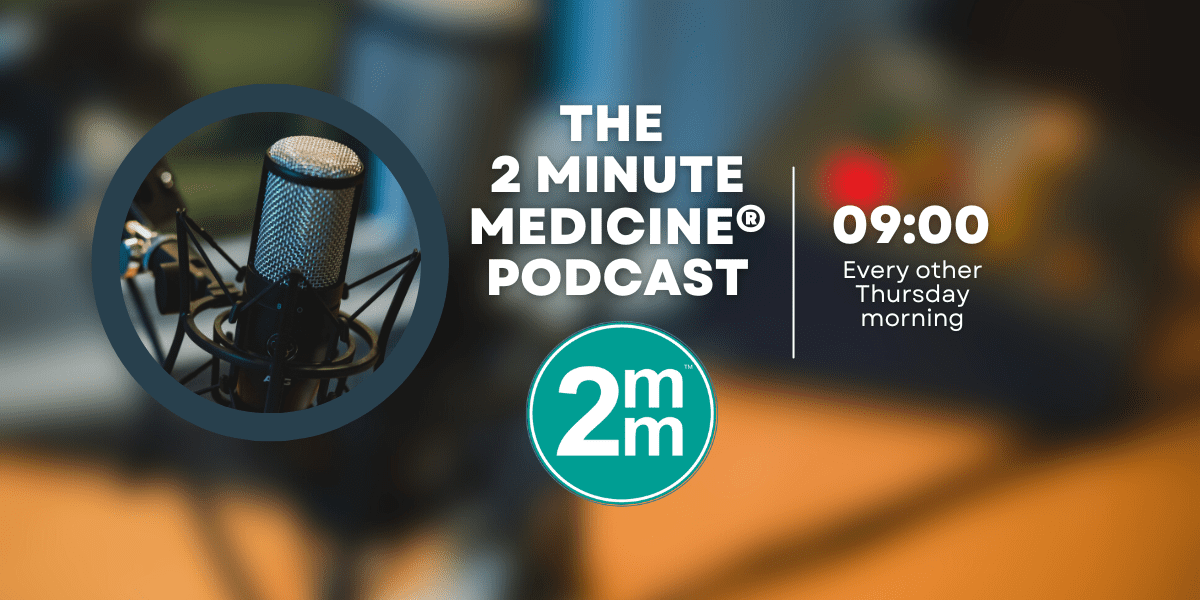
The 2 Minute Medicine Podcast Episode 39
Welcome to the 2 Minute Medicine Podcast, summarizing the latest medical studies, curated and written by practicing physicians. On this podcast, twice a month, we cover the latest in healthcare news and research evidence.
We begin with a discussion about our article of the week from the Lancet and is entitled “Global disease burden of and risk factors for acute lower respiratory infections caused by respiratory syncytial virus in preterm infants and young children in 2019: a systematic review and meta-analysis of aggregated and individual participant data”. In the second half of the episode we have a conversation about the rise in counterfeit Botox use, the cognitive benefits of playing chess, pros and cons of melatonin supplements and the recent increase in reported Measles cases.
Click here to listen to this episode on Apple podcast
Click here to listen to this episode on Spotify
Transcript
[Deepti] Welcome to the 2 Minute Medicine Podcast, summarizing the latest medical studies, curated and written by practicing physicians.
For our full suite of daily medical study summaries and updates written by practicing doctors, please visit our website at 2minutemedicine.com to start reading new daily content right now, for free. On this podcast, twice a month, we cover the latest in health care news and research evidence. We are your hosts Deepti and Andrew. On today’s episode, we’ll start off by discussing our two articles of the week. In the second half of the episode, we will look at health issues that have arisen in popular media.
[Andrew] The article of the week comes from The Lancet and is entitled “Global disease burden of and risk factors for acute lower respiratory infections caused by respiratory syncytial virus in preterm infants and young children in 2019: a systematic review and meta-analysis of aggregated and individual participant data”. Infants born prematurely face an increased risk for severe respiratory infections, particularly from respiratory syncytial virus (RSV). Until now, few studies have successfully assessed the global burden and risk factors associated with RSV-related acute lower respiratory infections (ALRIs) in preterm infants. This systematic review and meta-analysis aimed to quantify RSV-associated ALRI incidence and severity outcomes among premature infants. 3302 studies published in MEDLINE, Embase, and Global Health between Jan 1, 1995, and Dec 31, 2021, were assessed for eligibility. Included were patients born <37 weeks gestational age (wGA) with RSV-associated ALRI incidence and risk factors. 64 studies were included in the analysis. The primary outcome of RSV-associated ALRI incidence and hospitalization was significantly higher among preterm infants than for infants born at any gestational age (rate ratio [RR] 1.69-3.87). This was also the case for RSV-related hospitalizations among early preterm infants (<32 wGA) in their second year of life (RR 2.26, 95% uncertainty range [UR] 1.27-3.98). Furthermore, late preterm infants (32 to <37 wGA) had higher RSV-associated ALRI hospitalization rate in the first 6 months (RR 1.93, 95% UR 1.11-3.26). Findings from this study suggest that preterm infants bear a significant burden of RSV-associated disease, emphasizing the need for preventive measures to reduce morbidity and mortality in this vulnerable population.
[Andrew] Now for the scan.
The Story: Botulinum toxin, commonly known as Botoxis prompting concern in the USA, due to a rise in counterfeit Botox use. Let’s take a closer look at what Botox is
[Deepti] Great idea! In a nutshell, Botox is a toxin, derived from a type of bacteria, but in addition to being a potent poison, it has many important uses in humans. This toxin is the culprit behind a severe foodborne disease, botulism, which causes muscle paralysis and vision disturbances. This toxin works by blocking the release of acetylcholinea critical neurotransmitters used by nerves to signal the muscles to move.
While it can be dangerous, controlled doses of Botox are used in many medical settings. In fact, the original uses of Botox were to treat individuals with muscle spasms and crossed eyes. Today, the primary use of Botox is in cosmetic surgery,making use of the muscle paralytic properties to reduce wrinkles, as well as to treat hyperhidrosis, a socially isolating condition marked by excessive sweating. Botox can also be used to treat migraines and issues of bladder overactivitymaking it an extremely versatile treatment when used in extremely controlled doses. Many celebrities have had treatments with Botox, such as Kim Kardashian and Gwyneth Paltrow.
[Andrew]: In the US, over 20 people in 11 states have falling sick after receiving Botox injections from unlicensed sources. thesis counterfeit injections may be a result of injection from both licensed or unlicensed individuals, but the product used for the injections is not licensed. As a result, these counterfeit injections have led to symptoms of muscle paralysis, vision problems, and other symptoms that are very similar to botulism. Fortunately, in many cases of botulism antitoxin can be administered. This antitoxin must be given as soon as possible, as it protects the toxin from affecting more areas, but it is unable to reverse any damage that has already been done. Nearly half of the individuals affected by administration of counterfeit Botox were hospitalized, with antitoxins needing to be administered in some cases. Despite the many important uses of Botox, it is critical to ensure that Botox is treated as a medical procedure and administered by trained professionals using approved substances. Next, let’s take a closer look at the relationship between chess and cognition.
[Deepti] The 2024 FIDE Candidates tournamentone of the largest tournaments in the world of chess, has concluded by crowning 17 year old Gukesh Dommaraju as the winner. The tournament, held in Toronto, Canada, featured a wide range of ages, from 17 and 18 year olds, to individuals in their 30s. The vast age range of players at the absolute top level of chess, highlights the age-agnostic nature of the game. In fact, chess and other strategy games are associated with reductions in risk of dementia. Chess is also associated with many others positive cognitive domains, such as increased creativity, memory, and planning skills. For a multifactorial disease like dementiait is impossible to say whether playing a strategy game can prevent its development, however current research has indicated positive effects on a variety of cognitive markers. Improved attention, executive function and quality of life was observed in a sample of older adults playing chess for 2 hours per week.
[Andrew] That’s right! And its not just for older adults! There is some evidence pointing towards chess having positive effects on cognition in younger children as well. There is no secret that in addition to being potentially good for you, chess is also a fun game! Basketball star Luka Doncic has talked about his love of chessand small tournaments have even been organized by football teams across the USA. What better way to potentially benefit one’s brain health than by literally playing a game? Now, let’s have a conversation about how recent evidence has discovered that between 2019 and 2022, nearly 11,000 children were taken to the hospital after an overdose of melatonin. A natural hormone produced by the body, melatonin is involved in the normal cycle of sleep and waking that goes on each day. Many individuals take melatonin supplements to assist with sleep with conditions such as insomnia.
[Deepti] Although it is a naturally produced hormone, there can be side effects to take melatonin in large doses through supplementation. Headaches, mood changes, and daytime sleepiness can be seen with melatonin use, and the long term effects of melatonin use are still not fully understood. Melatonin is often sold in gummy formulations, which can make them appetizing to children. Although extremely rare, there have been instances of children developing blood pressure problems and even death, as a result of melatonin overdose. These latest findings are prompting calls for improved labeling on melatonin supplements. Childproof packaging, clear warnings about drowsiness, and indications for occasional use, are among the proposed changes to packaging in a bid to make supplements less accessible for children, and to help adults become more cognizant of the intended uses. It is no accident that melatonin use is on the rise, given that sleep disorders are also increasing in prevalence. While melatonin may be suitable for occasional use, non-pharmacological interventions may also help improve sleep. Maintaining a consistent bedtime and wake time, removing electronics before bed, and staying physically active are all key elements in building strong sleep habits. As well, getting suitable amounts of natural light by spending time outdoors can help improve sleep quality. While these tips may not solve all sleep-related problems, they can certainly help to avoid a dependence on melatonin, given the uncertainty about long-term melatonin use. Now, let’s discuss the return of measles.
[Andrew]: Once considered a disease of the past, recently the USA has seen an increase in cases of measles, a severe airborne disease. Generally, the measles virus affects children and results in rashes, fever, cough, and others symptoms. Since 2000, there has been a worldwide reduction in measles deaths over 70%, although this disease is still common in developing countries. Measles what eliminated from the USA in 2000, indicating that the endemic spread of measles had stopped, and the only new cases are a result of travel. Now, over 100 cases have been reported in over 15 states since the beginning of 2024. Despite the severity of this disease, the majority of treatment relies on an individual’s own ability to fight off the disease, unlike bacterial diseases which may benefit from antibiotics.
[Deepti] The best form of defense against measles is vaccination. This highly effective and safe vaccine boasts a nearly 97% effectiveness rate after two doses. This vaccine is able to induce an immune response by injection of a weakened measles virus into the body, for recognition by the immune system. This acts as a primer for the body, so that in the case of an individual being exposed to measles, the immune system is able to mount a swift response to eliminate the virus.
[Andrew] One of the reasons for the resurgence of measles cases, is hypothesized to be due to a decline in vaccinations. Measles has a nearly 20% hospitalization rate in unvaccinated individuals, and unfortunately many families have had to contend with dangerous experiences due to a lack of vaccinations, or even ineligibility. In England, cases are also rising, with nights in hospital and medical assistance in eating and breathing required in some very severe cases. Despite the increase in cases, the overall vaccination rate in the American population remains relatively highmaking it very important to continue upholding this immunity to prevent further outbreaks.
Thank you for joining us today for this episode of the 2 Minute Medicine Podcast. New episodes come out every other week and all of our content has been curated and written by practicing physicians.
Please head to our website at 2minutemedicine.com to learn more and to access all of our content including medical study summaries, visual abstracts, excerpts from our Classics book series which is available on Amazon, and The Scan, which is our medical newsletter.
Thank you so much once again. To make sure that you don’t miss any of our content please subscribe and follow us on Twitter or Instagram @2MinMed
©2024 2 Minute Medicine, Inc. All rights reserved. No works may be reproduced without expressed written consent 2 Minute Medicine, Inc. Inquire about licensing here. No article should be construed as medical advice and is not intended as such by the authors or by 2 Minute Medicine, Inc.

Ethel Purdy – Medical Blogger & Pharmacist
Bridging the world of wellness and science, Ethel Purdy is a professional voice in healthcare with a passion for sharing knowledge. At 36, she stands at the confluence of medical expertise and the written word, holding a pharmacy degree acquired under the rigorous education systems of Germany and Estonia.
Her pursuit of medicine was fueled by a desire to understand the intricacies of human health and to contribute to the community’s understanding of it. Transitioning seamlessly into the realm of blogging, Ethel has found a platform to demystify complex medical concepts for the everyday reader.
Ethel’s commitment to the world of medicine extends beyond her professional life into a personal commitment to health and wellness. Her hobbies reflect this dedication, often involving research on the latest medical advances, participating in wellness communities, and exploring the vast and varied dimensions of health.
Join Ethel as she distills her pharmaceutical knowledge into accessible wisdom, fostering an environment where science meets lifestyle and everyone is invited to learn. Whether you’re looking for insights into the latest health trends or trustworthy medical advice, Ethel’s blog is your gateway to the nexus of healthcare and daily living.



